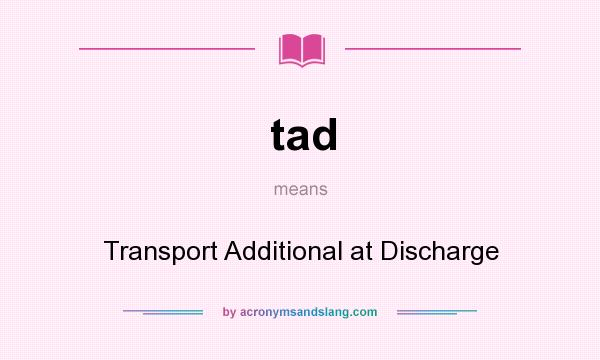

Here’s a 1977 example from the Toronto Globe and Mail: “Things are a tad hectic.”Īnd here’s a 1980 usage from the New York Times: “The Mayor’s pitch is a tad exaggerated both on the law’s certainty and on the roominess of New York’s prisons.”

At any rate, “tad” soon entered the mainstream. The article said “tad” meant “a very small amount,” as in the sentence “I want to borrow a tad of salt.”īut the expression was obviously around for some time before it caught the attention of language scholars. The OED’s first citation is from a 1940 issue of the journal American Speech, in an article about Tennessee expressions. It wasn’t until the 20th century that “a tad” came to mean a small amount or, used as a modifier, a little, slightly, or somewhat. But the modern sense of something small was first recorded in the 1870s, when a “tad” or a “little tad” meant “a young or small child, esp. “Tad” first cropped up in 1845 with a different, unrelated meaning: someone who can’t or won’t pay. It combines the Middle English word tade or tadde (toad) and, apparently, the noun “poll” (head or roundhead.) It was first recorded in the 1400s, the OED says, as “taddepol.” It’s originally and chiefly North American, according to the Oxford English Dictionary, and may be derived from “tadpole.”īy the way, “tadpole” is interesting too. Here’s a link to one post.īut let’s look more closely at “tad,” an interesting noun. We’ve written about this subject several times before on our blog, in discussions of phrases like “first time ever,” “fourteen different countries,” “meet up with,” “face up to,” “try out,” “divide up,” “hurry up,” “lose out on,” and many more that some people find redundant. A good example is “Raid kills bugs dead.” And we think “tad bit” is the kind of expression in which that extra emphasis can be defended.īesides, there’s a kind of expression (the writer Ben Yagoda calls it “the salutarily emphatic redundancy”) that is memorable chiefly because of its apparent repetition. People use “little bit” too, and nobody seems to mind.Īs we’ve said before, there’s a fine line between an emphatic use and a redundancy. The phrase is not formal English, after all, but a folksy and semi-humorous usage. The result is a redundancy that’s parallel to “the most teeny-weenie-est.” What do you think?Ī: Aren’t you being just a tad bit picky here? Yes, it’s true that a “tad” means a “bit,” but why not regard “tad bit” as reinforcement rather than a repetition? I know I’ve heard it before, but it struck me now as a tad bit odd, since “tad” means a very small amount, and a “bit” is also a very small amount. Q: I just heard the phrase “a tad bit” on the radio.


 0 kommentar(er)
0 kommentar(er)
